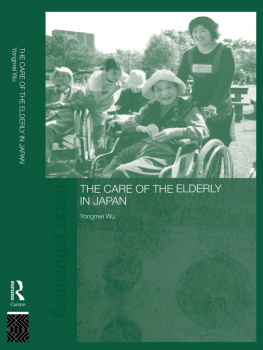The Care of the Elderly in Japan
The problems of an ageing population are particularly acute in Japan. With people living longer, many need more care; and this section of the population requires increasing support while there is a diminishing working population and a diminishing tax base.
This book, based on extensive fieldwork in a Japanese institution for the elderly, explores the problems associated with ageing and responses to it in Japan. By looking at the institution from the viewpoints of residents, staff and visitors, as well as from the policy point of view, the book carefully assesses how far the home succeeds in offering an acceptable quality of life to the residents. It gives insights into the life and work of long-term care institutions; discusses how people in Japan have changed their perceptions towards family responsibility, the institutionalisation of the elderly, and welfare rights; and examines how institutions for the elderly are run in Japan and how their management differs from that of those in the West.
Yongmei Wu is a Lecturer at the Beijing Centre of Japanese Studies, Beijing Foreign Studies University. She received her PhD in Japanese Studies from the University of Hong Kong. She was a research fellow at the Japan College of Social Work and a visiting researcher in the University of Tokyo. Her research interests include cross-cultural ageing research in Japan and China, Asian welfare models, gender and family.
Japan Anthropology Workshop Series
Edited by Joy Hendry
Oxford Brookes University
Editorial Board
- Pamela Asquith, University of Alberta
- Eyal Ben Ari, Hebrew University of Jerusalem
- Hirochika Nakamaki, National Museum of Ethnology, Osaka Wendy Smith, Monash University
- Jan van Bremen, University of Leiden
A Japanese View of Nature
- The World of Living Things Kinji ImanichiTranslated by Pamela J. Asquith, Heita Kawakatsu,
- Shusuke Yagi and Hiroyuki Takasaki
- Edited and introduced by Pamela J Asquith
Japan's Changing Generations
- Are Young People Creating a New Society?
- Edited by Gordon Mathews and Bruce White
The Care of the Elderly in Japan
The Care of the Elderly in Japan
Yongmei Wu
First published 2004
by RoutledgeCurzon
2 Park Square, Milton Park, Abingdon, Oxon, OX14 4RN
Simultaneously published in the USA and Canada
by RoutledgeCurzon
270 Madison Ave, New York NY 10016
RoutledgeCurzon is an imprint of the Taylor & Francis Group
Transferred to Digital Printing 2005
2004 Yongmei Wu
Typeset in Times by Taylor & Francis Books Ltd
All rights reserved. No part of this book may be reprinted or reproduced or utilised in any form or by any electronic, mechanical, or other means, now known or hereafter invented, including photocopying and recording, or in any information storage or retrieval system, without permission in writing from the publishers
British Library Cataloguing in Publication Data
A catalogue record for this book is available from the British Library
Library of Congress Cataloging in Publication Data
A catalog record for this book has been requested
ISBN 0-415-32319-3
To my son and my parents, for their dedicated love and everlasting support
Illustrations
Figure
Organisation and numbers of staff
Map
The location of Kotobuki Home
Tables
Comparison of the Gold Plan (1990) and the New Gold Plan (1994)
Plan of middle-aged persons aged 3049 years for care of parents when they become bedridden
Percentages of old persons living with children
Trends in the percentage of households by family type containing at least one elderly person aged 65 and over, Japan, 1975-95
Series preface
Members of the Japan Anthropology Workshop carry out detailed and insightful research in Japan, and meet regularly to present papers about their work and to exchange views on the subjects of their study. This series aims to bring the best of their work into print, and to make it available as soon as possible. In this way we aim to offer a deeper understanding of contemporary Japanese society that records changes as they take place as well as illuminating the underlying continuity of Japanese ideas. Anthropologists specialise in digging beneath the surface, in peeling off and examining layers of cultural wrapping, and in gaining an understanding of language and communication that goes beyond formal presentation and informal frolicking. I hope that the series will open the eyes of readers from many backgrounds to the work of these diligent 'moles' in the social life of Japan.
Our series is open to the inclusion of translations of the work of Japanese scholars, collections of papers around particular themes, and monographs of ethnographic research on a range of different topics. The first book in the series was a translation of the work of the seminal Japanese anthropologist, Imanishi Kinji, who had profound ideas about the place of human beings in the living world. His ideas do not confirm theories that go almost unquestioned in the West, and we hope that the book will make readers rethink one or two of their long-held assumptions. The second book was a collection of papers about generational change in Japan, and presented the views of young people, Japanese and foreign, who had worked with young people. It gave a fresh picture of possibilities for the future.
The present volume is a monograph of ethnographic research, and exemplifies the method of participant observation that is a mainstay of anthropological field research. Here the aim is to get as far as is reasonably possible inside the lives of the people who are the focus of the study and thereby to gain deep insights into the way that they are organised. This method brings the reader most successfully into the heart of the subject in hand, and Wu has brought this aim neatly to fruition. She worked with the elderly in Japan to find out on the ground how society copes with the increasing numbers of people who are gradually losing the ability to care for themselves. By guiding the reader through the various circumstances of real residents of the large care home where she worked, as well as those of employees and volunteers who worked there, she depicts in fine detail the quality of life that they can expect, and relates it to their actual experience.
Joy Hendry
Foreword
The rapid ageing of the population and the subsequent concerns about care for frail older people can no longer be considered characteristics of only a few industrialised nations. Academic gerontology and clinical elder care institutions and practices which have developed in Western cultural contexts are now being studied, adapted and sometimes challenged as other societies face these demographic changes.
In Japan, as in all societies, most elderly who need assistance in daily living receive help from family members, friends and neighbours. Yet long life expectancies, small families, job mobility, increased participation of middle-aged women in the formal labour force, and changing definitions of family roles have combined to make it more difficult or less desirable to provide that care informally. Japanese policies for the last several decades have increasingly placed responsibility for the welfare of its oldest citizens on government, although the facilities and agencies offering the services may be local government offices, social service agencies, non-governmental organisations or for-profit corporations. Recent years have seen greatly increased 'demand' for institutional care for frail elderly, with which a 'boom' in long-term care beds cannot keep up. There remains a great deal of ambivalence about formal services, especially residential institutions. Yet the long-term care insurance programme that began operating in 2000 is based on the concept of a 'right' to such care, and after years of paying premiums into the system, demand can be expected to increase even more in the coming decades.






